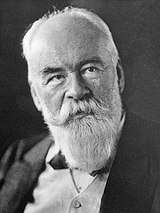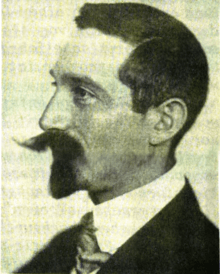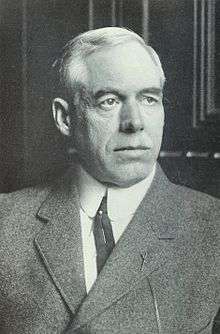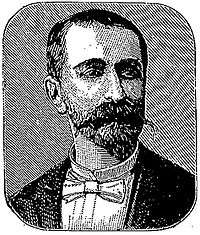Cartel theory
Cartel theory is usually understood as the doctrine of economic cartels. However, since the concept of 'cartel' does not have to be limited to the field of the economy, doctrines on non-economic cartels are conceivable in principle. Such exist already in the form of the state cartel theory and the cartel party theory. For the pre-modern cartels, which existed as rules for tournaments, duels and court games or in the form of inter-state fairness agreements,[1] there was no scientific theory. Such has developed since the 1880s for the scope of the economy, driven by the need to understand and classify the mass emergence of entrepreneurial cartels. Within the economic cartel theory, one can distinguish a classical and a modern phase. The break between the two was set through the enforcement of a general cartel ban after Second World War by the US government.[2]
Classic cartel theory


The origin of the usage of 'cartel' for entrepreneurial co-operations was the German speaking region of Central Europe. Already in the 1870, 'Cartell' came up for railway companies who unified their technical standards, pooled their stocks of railroad cars and coordinated their time schedules.[3]
In 1883, an explanatory framework was based upon this novel understanding of "cartel": the classic cartel theory, which was in the same way of German origin: The Austro-Hungarian professor of economics Friedrich Kleinwächter had condensed a number of case studies to the draft of an empirical theory.[4] Cartel theory remained for decades the product, above all, of Central European economists of German tongue. That approach was well-intentioned to the entrepreneurial cartels and in this respect was functionalist and institutionalist.[5] It had its origin in the historical school of economics. The classic cartel theory itself went through three stages of development:
- an early one, partly naive, in which the "historical school of economics" strongly dominated (Gustav von Schmoller, Karl Bücher, Lujo Brentano),
- a middle one, which was characterized by the introduction of more economic theory (especially Robert Liefmann) and
- a late one that was influenced by the entry into the organized economy of the German Third Reich following the depression of 1929-1933 (see, for example, Heinz Müllensiefen).
The theory variants of the non-German countries


Outside of the German speaking countries, there were more or less similar theories of economic organization. These variants existed until the 1920s (in Italy until after 1945). However, they operated with different basic terms such as (in French) "syndicat", "accaparement", (in Italian) "sindacati", (in English) "combination" or "trust". In France Francis Laur and Paul de Rousiers, in Italy Francesco Vito, in the USA Jeremiah Jenks and in the United Kingdom Henry W. Macrosty as well as David H. MacGregor were authoritative writers on economic combinations.
Modern cartel theory
The modern cartel theory, which followed the classical cartel doctrine is essentially of American origin (George J. Stigler and George W. Stocking in the 1940s) It was based on the liberal view upon economy, which already had coined the traditional antitrust concept of the 1890s. The modern doctrine rejects cartels more or less fundamentally and is therefore not much interested in the internal organization of existing cartels, which are combated (and therefore only loosely institutionalized). Subsequently, modern cartel theory is quite oriented to pure economic theory and to economic policy.[6] The organizational-science aspects of the classical cartel theory did not find a continuation in modern cartel theory.
Differences between the two cartel theories
Modern cartel theory points out - much more committed than the classical one - to the detrimental consequences of a lack of competition that leads to overpricing, misallocation of capital and slowing down of technical progress in the economy. In this context, this doctrine has helped to develop the paradigm of market failure, which must be avoided by means of an appropriate competition policy. On the other hand, the disadvantages of unrestrained competition - such as unnecessary bulk goods transport, unnecessary advertising for mature goods, brand sales strategies - are highlighted in the classic cartel theory. Thus, these two directions of cartel studies feature conflicting, mutually exclusive economic concepts and neither of them can ideally solve the fundamental problem of entrepreneurial competition.
Terminologically, classical cartel theory has yielded sophisticated definitions and classifications of cartel types that were based on material institutional criteria. By contrast, modern cartel theory is essentially normative. Its specific terminology depends on the respective competition law, its national version of the cartel ban and exemptions for useful cartels.[7]
Cartel systems theory, general cartel theory
According to an analysis by Holm Arno Leonhardt, classical cartel theory can be understood (after a deconstructive adjustment) as an interdisciplinary systems theory in the field of the social sciences.[8] Abstracted from the concrete circumstances of the individual types of competition, an overarching theory of the social system 'cartel' emerges. Leonhardt defines this through nine basic statements on the factors arena, actors, interactions, structures, functions, equilibrium condition, driving forces, development path and system environment: Groups of independent, homogeneous actors are on certain arenas (action fields) on the way. Their egoism leads to competition and conflict. These are perceived as disturbing or threatening and lead to collusion on fairness rules and reconciliation of interests, e.g. by joint ventures. The adopted standards, agreements and projects need to be enforced and monitored, creating multi-stakeholder organizations – cartels. The equilibrium condition of the system is the win-win constellation: all members of a group want to benefit from it as well. The driving force that leads to cartel formation and successively condenses the associations on a development path to higher organizational forms is rationalization. The latter is only exhausted when an arena-wide organization has emerged and is fully developed, such as a trust corporation or a world state. In the economy this tendency is permanently suppressed by the competition policy of the state. There is no such instance in international relations, so that the world state perspective remains in force.
Bibliography
- Friedrich Kleinwächter: Die Kartelle. Ein Beitrag zur Frage der Organisation der Volkswirtschaft. Innsbruck 1883.
- Francis Laur: De l'accaparement. Essai doctrinal. 1900. Paris: Publ. scient. & industr.
- Jeremiah W. Jenks (1903): The trust problem. Several ed. 1900-03. New York: McClure.
- David H. MacGregor: Industrial combination. 1906. London: Bell.
- Henry W. Macrosty: The Trust movement in British Industry. A study of business organisation. 1907. London: Longmans, Green.
- Paul de Rousiers: Les Syndicats industriels de producteurs en France et à l'Étranger. Trusts-Cartells-Comptoirs-Ententes internationales. 2. ed. 1912. Paris: Colin.
- Robert Liefmann: Kartelle, Konzerne und Trusts. Several ed. within the 1920s.
- Francesco Vito: I sindacati industriali. Cartelli e gruppi. 1930. Milano: Vita e pensiero.
- Arnold Wolfers: Das Kartellproblem im Licht der deutschen Kartellliteratur. München 1931.
- Robert Liefmann: Cartels, Concerns and Trusts. London 1932.
- Heinz Müllensiefen: Freiheit und Bindung in der geordneten Wirtschaft: Kartellgesetzgebung und Marktordnung in der gewerblichen Wirtschaft. Hamburg 1939.
- George J. Stigler: The extent and bases of monopoly. In: The American economic review, Bd. 32 (1942), S. 1–22.
- George W. Stocking: Cartels In Action (with M.W. Watkins). New York: Twentieth Century Fund 1946.
- George W. Stocking: Cartels or competition? The economics of international controls by business and government (with M. W. Watkins). New York: Twentieth Century Fund 1948.
- Wyatt C. Wells: Antitrust and the Formation of the Postwar World. New York 2002.
- Tony A. Freyer: Antitrust and global capitalism 1930–2004. New York 2006.
- Holm Arno Leonhardt: Kartelltheorie und Internationale Beziehungen. Theoriegeschichtliche Studien, Hildesheim 2013.
- Holm Arno Leonhardt: The Development of Cartel Theory between 1883 and the 1930s - from International Diversity to Convergence. Hildesheim 2018. Online-Ressource.
References
- Holm A. Leonhardt: Kartelltheorie und Internationale Beziehungen. Theoriegeschichtliche Studien, Hildesheim 2013, p. 50-52.
- Wyatt C. Wells: Antitrust and the Formation of the Postwar World. New York 2002; Tony A. Freyer: Antitrust and global capitalism 1930–2004. New York 2006.
- Leonhardt: The development of cartel+ theory between 1883 and the 1930s. Hildesheim 2018, p. 15.
- Friedrich Kleinwächter: Die Kartelle. Ein Beitrag zur Frage der Organisation der Volkswirtschaft. Innsbruck 1883
- A good overview by: Arnold Wolfers: Das Kartellproblem im Licht der deutschen Kartellliteratur. München 1931.
- On the German case: Holm A. Leonhardt: Kartelltheorie und Internationale Beziehungen. Theoriegeschichtliche Studien, Hildesheim 2013, p. 337–355
- On the German case: Holm A. Leonhardt: Kartelltheorie und Internationale Beziehungen. Theoriegeschichtliche Studien, Hildesheim 2013, p. 340–348
- Leonhardt: Kartelltheorie und Internationale Beziehungen, p. 192–197